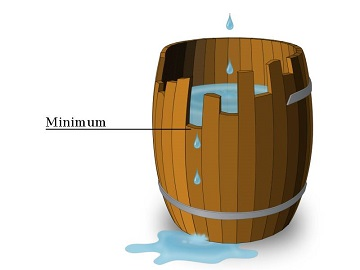You have m = n·k wooden staves. The i-th stave has length ai. You have to assemble nbarrels consisting of k staves each, you can use any k staves to construct a barrel. Each stave must belong to exactly one barrel.
Let volume vj of barrel j be equal to the length of the minimal stave in it.

You want to assemble exactly n barrels with the maximal total sum of volumes. But you have to make them equal enough, so a difference between volumes of any pair of the resulting barrels must not exceed l, i.e. |vx - vy| ≤ l for any 1 ≤ x ≤ n and 1 ≤ y ≤ n.
Print maximal total sum of volumes of equal enough barrels or 0 if it's impossible to satisfy the condition above.
The first line contains three space-separated integers n, k and l (1 ≤ n, k ≤ 105,1 ≤ n·k ≤ 105, 0 ≤ l ≤ 109).
The second line contains m = n·k space-separated integers a1, a2, ..., am (1 ≤ ai ≤ 109) — lengths of staves.
Print single integer — maximal total sum of the volumes of barrels or 0 if it's impossible to construct exactly n barrels satisfying the condition |vx - vy| ≤ l for any 1 ≤ x ≤ n and1 ≤ y ≤ n.
4 2 1
2 2 1 2 3 2 2 3
7
2 1 0
10 10
20
1 2 1
5 2
2
3 2 1
1 2 3 4 5 6
0
In the first example you can form the following barrels: [1, 2], [2, 2], [2, 3], [2, 3].
In the second example you can form the following barrels: [10], [10].
In the third example you can form the following barrels: [2, 5].
In the fourth example difference between volumes of barrels in any partition is at least 2 so it is impossible to make barrels equal enough.
诸事不顺,操
一个贪心,其实就是分为n堆数,每堆数的最小值相差不能大于limit ,
求出n堆数最小值的和
upper_bound 返回的是第一个大于的数,减去1就是小于等于的数了
1 #include <bits/stdc++.h> 2 using namespace std; 3 const int maxn = 1e5 + 10; 4 long long a[maxn]; 5 int n, k, limit; 6 int main() { 7 scanf("%d%d%d", &n, &k, &limit); 8 for (int i = 0 ; i < n * k ; i++) 9 scanf("%lld", &a[i]); 10 sort(a, a + n * k ); 11 int temp = upper_bound(a, a + n * k, a[0] + limit) - a; 12 long long ans = 0; 13 int sum = n * k; 14 if (temp >= n) { 15 int temp1=temp; 16 while(sum > temp && sum - temp >= k - 1) { 17 sum -= k - 1; 18 ans += a[--temp1]; 19 } 20 for (int i = 0 ; i * k < temp1 ; i++) 21 ans += a[i * k]; 22 } 23 printf("%lld ", ans); 24 return 0; 25 }